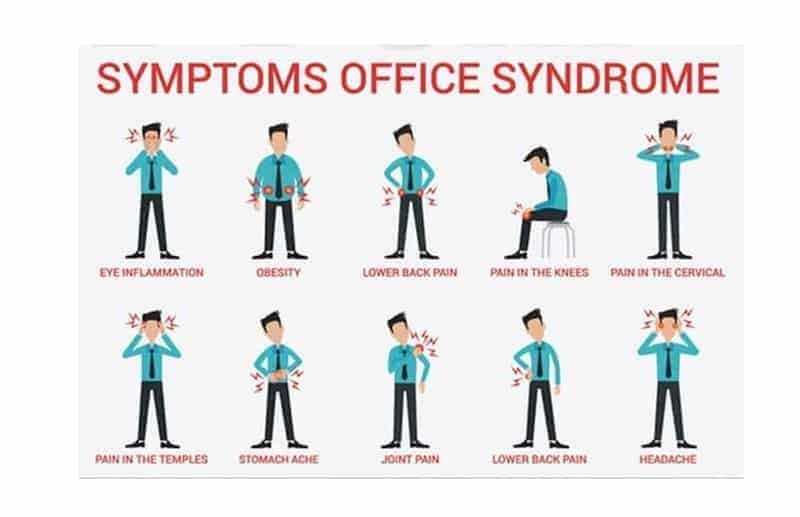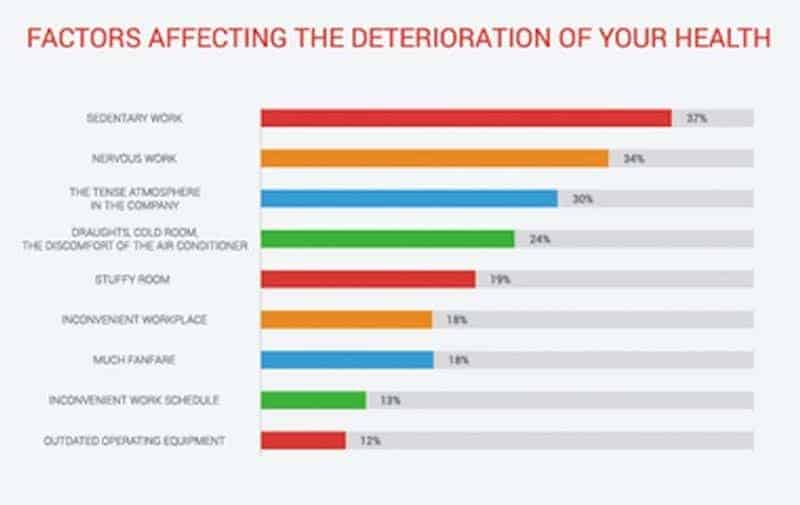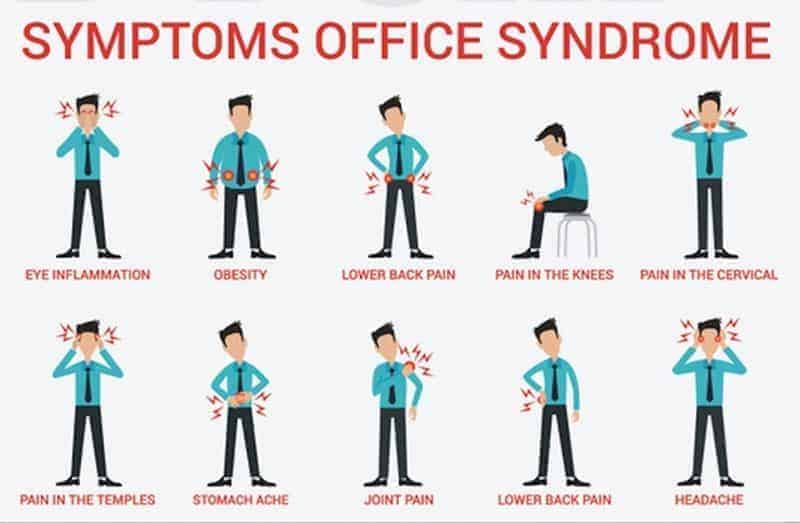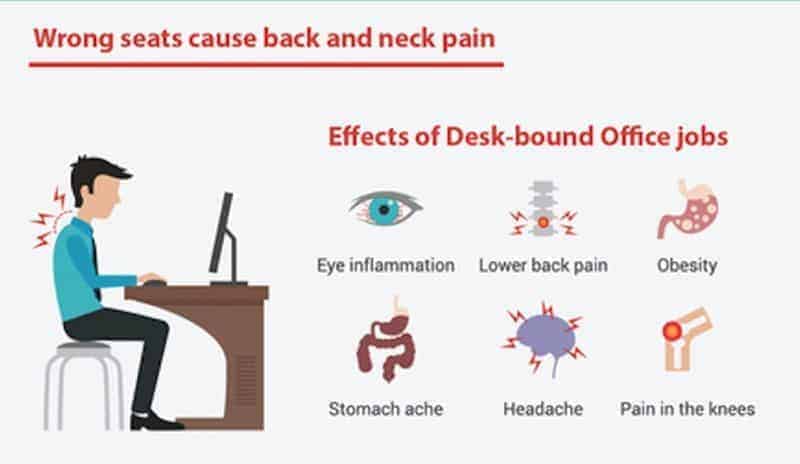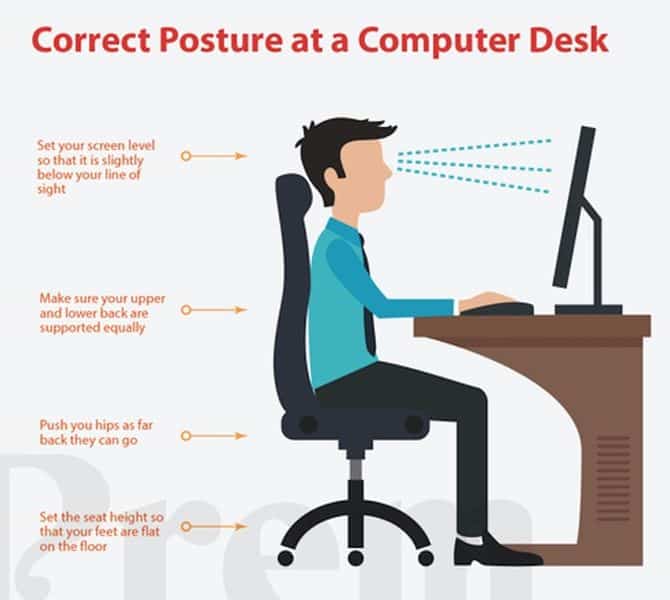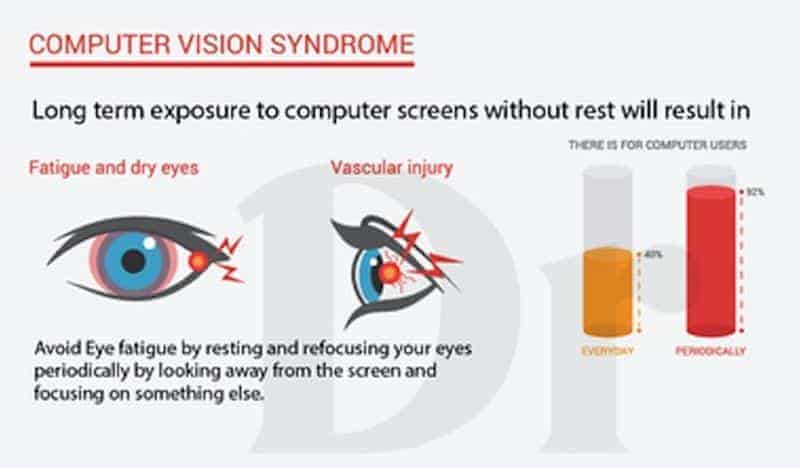The workplace is our lifeline for sustenance where we devote about 80% of our waking hours. To meet the ever-increasing demand of the workplace, most of us are enforced to extending working hours with very little resting time essential to recover from the day-long battle.
Even if one manages few hours of rest, it is mostly spent in front of some digital or electronic screens, which does more harm than good. We often lose count of the hours that we spend daily on an average in front of the TV, computer and mobile gadgets seeking some stress-busting way outs. The result is we suffer from a condition known as office syndrome.
Workplace factors can affect a person’s health and wellbeing seriously which can be listed as follows:
- Sedentary work mainly desktop work involving minimum movement.
- Tense working situation prevailing in the organization.
- Discomforts arising due to prolonged exposure to air-conditioners.
- Congested office rooms with poor lighting and ventilation systems.
- Inconvenient work schedule
- Outdated operating equipment.
Office Syndrome:
Sounds new? Isn’t it? But the symptoms are quite known. Amidst the stress-laden modernized working conditions, unknowingly we develop ‘Office Syndrome’ (also known as sick building syndrome), a cluster of painful and disturbing symptoms in our body, enough to disrupt the quality of life and affect the productivity as well. This seriously violates the basic principles of corporate wellness.
This syndrome, if not tackled timely, may turn out to be chronic with aging and unchanged workplace habits adding an extra healthcare expenditure that may run throughout your life. Office syndrome needs to be properly addressed in corporate wellness programs to maintain employee productivity.
Are you suffering from Office Syndrome?
Watch out the symptoms:
- Regular headache
- Inflammation of the eye
- Lower back pain
- Joint pain
- Knee pain
- Pain in the shoulder, neck, and temples
- Stomach ache
- Obesity
If you are bothered by any one or two of the above symptoms with no underlying medical condition, then you need to have a good understanding of Office Syndrome.
Understanding Office Syndrome:
As per the century-old BNH Spine Center, “Office Syndrome is caused by unhealthy habits and improper use of muscle such as staying in the same posture for a prolonged period without sufficient movement”. This syndrome strikes most within the working population falling in the age group of 30-55 years.
Let us delve deep into the matter. Most of us remain seated in the same posture in front of our desktops/laptops for hours with eyes focused completely on the screen, sheets and charts. We seldom stand or move unless it is required. This prolonged lack of muscle and joint movements is bound to give rise to several physical discomforts.
Factors causing office syndrome
Watch out the following:
- The sitting posture in front of the computer or working desk. Most of the time it is the wrong one. For example, crouching, leaning or sitting in the cross-legged posture.
- Height of the chair and table. These are often not properly adjusted.
- Alignment of the chair. The angle of inclination and comfort level of your seating arrangement.
- The distance between your eyes and the computer screen (desktop/laptop).
- The position of your elbow while operating the keyboard.
You may not give due importance to the above but it may go a long way in creating painful situations in the near future. Remember regular sitting position affects the alignment of the muscles, bone joints, vertebral discs, and even nerves.
What are the effects of Office Syndrome?
- Eyes no doubt would be the first victims. Eye fatigue and dry eyes are very common arising due to prolonged glaring at the computer screens. One may also suffer from vascular injury of the eyes.
- Pain in different parts of the body which mainly starts from neck, shoulders, and back. You may even feel pain in your wrists, hands, elbows, and knees.
- In extreme cases, a person may suffer from slip disc indicating that your body’s capacity of stress handling has been pushed beyond the limit.
- Poor ventilation due to air-conditioners may lead to the spreading of cold and other viral infections.
- Prolonged sitting may cause inflammation of intestine causing hemorrhoids.
- Gaining weight in spite of no changes in your daily eating habit.
Ways to tackle Office Syndrome:
Ways to tackle Office Syndrome:
The smartest way to manage Office Syndrome is to take preventive actions. Being great at work is no doubt good but it should not be at the cost of your health and wellbeing.
- Firstly, check your sitting arrangement. The chair should be comfortable with flexible back rest. It should support your upper and lower back equally. Push your hips inside the chair to the maximum.
- Your elbows should rest comfortably on the table.
- The height of your seat should be such that your feet rest comfortably on the floor.
- The screen of your computer should be set at a slightly lower level than your eyesight.
- Maintain optimum screen resolution.
- If you wear glasses, make sure they have antiglare or progressive lenses. If possible, check for antiglare computer and laptop screens.
- Enhance your mobility. If you remain seated at a stretch for more than 3-4 hours at a stretch, you are in for trouble. Get up from your seat every 1-2 hours and take a small walk. Do some light stretching and bending postures.
- After every 1 hour, take your eyes off from the computer screen and do some quick eye exercises. You can blink your eyes fast or roll them just for 5 minutes. This will reduce eye fatigue and dryness of eyes.
- Lastly, avoid eating junk foods while working.
How to prevent office syndrome while working from home?
Work from home (WFH) has become the new normal for corporate professionals. While Office Syndrome is represented as a cluster of symptoms arising in office, it can happen with WFH setting also. At home, you tend to spend more time than usual in front of computer screens. What you can do to prevent WFH-initiated Office Syndrome? Many professionals are already complaining of different problems in this new set up.
Apart from taking care of the basic postures, ergonomics and behaviors mentioned above, you need to have a recheck of the following:
Your seating arrangement
True that your office set up is entirely different from that in your home. Are you using an ergonomically designed chair or home chair? You may need to change it. If you are using the normal home chair, add thick and comfortable cushions to adjust the seat height making your seating more comfortable. Pad up the back of your chair to maintain an upright sitting position. If your WFH is a long-term setting, why not consider investing in an ergonomically-designed office chair?
Change your posture every one hour
This will allow your muscles to stretch preventing strain caused by sitting in the same position for hours. Follow the 20-20-20 rule with your eyes. Remove your eyes from the computer screen every 20 minutes for 20 seconds and look at any object 20 feet away. Or close your eyes for 5-10 minutes at frequent intervals.
Get into 15-20 minute workouts
You can do this after every 2 hours. Walk around your room for 10-15 minutes. If possible, take a short stroll outdoors. Do some stretching exercises of your back, arms, shoulders, neck and wrist. You may find it easy to do it in privy which might not be possible in office.
Drink enough water
That you are working from home does not mean you do not need the required hydration. Drink a glassful of water whenever you get up for walking or exercising.
Get into more activities
The line between work and personal life in the WFH should not be blurred. Sitting for extended hours means you are inviting Office syndrome. You may also become vulnerable to infections. Get into other recreational activities like gardening, outdoor sports and other physical activities to keep your system running normally.
Take care of your psychological necessities
WFH builds loneliness to some extent as you are likely to feel distanced from your colleagues. Plus, regular commuting brings in some welcome distraction which many people miss. Dealing with work-related stress whole day being stuck at home is not good for mental health. Talk with your friends and colleagues. Check each other’s mental condition and requirements and always extend your helping hand. This will give you the additional mood lift.
Treating Office Syndrome:
Well, in due course of time you may develop one or two symptoms of Office Syndrome which can be managed through simple treatments. But care should be taken not to allow these to aggravate further. Treatment might help in most of the cases, but if it doesn’t, then you should talk to the boss of the company. In extreme cases, you can also consider changing your job.
Treatments can be provided by
- Application of pain-relieving ointments to tackle body pain.
- Applying eye drops to prevent dry eyes.
- Medications as prescribed.
- Regular physical exercises to improve the mobility of joints and to check your weight gain as well
- Rehabilitation programs
- Massage therapy
- Traditional Chinese Medicine like acupuncture, herbal treatments, cupping therapy etc. could be beneficial as it helps in improving circulation by mobilizing the stagnant Qi energy.

